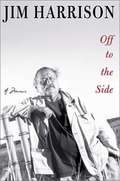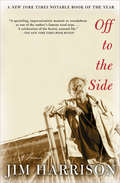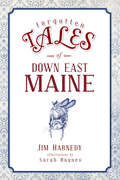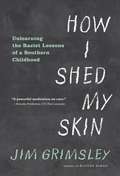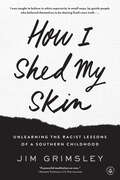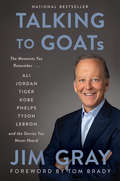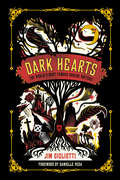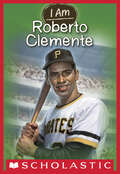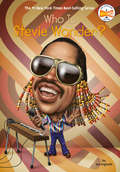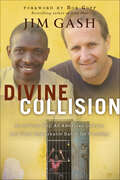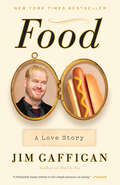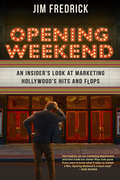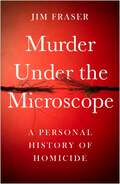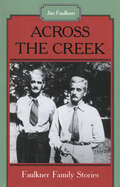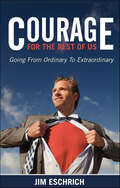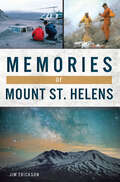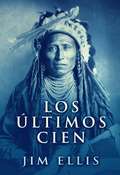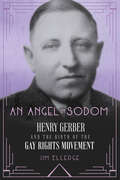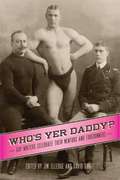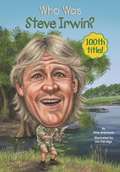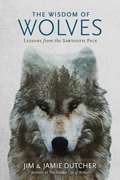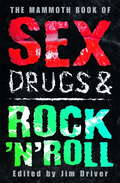- Table View
- List View
Off to the Side: A Memoir
by Jim HarrisonFrom the book jacket: For nearly forty years Jim Harrison has been one of America's most beloved writers, a literary giant who has given us American classics like Dalva, Legends of the Fall, and The Road Home. And he is perhaps just as loved for the spirit from which he writes-devoted to the senses, staunchly unpretentious, and ever mindful of the dangers of straying too far from our origins. It is this spirit of which The Oregonian wrote, "The magic of writing as good as Harrison's is that it can bridge the gulf of human separation." Now, for the first time, Jim Harrison has put pen to paper to write about his own life-a life that he captures with a riveting directness and a delightful, resonant music.
Off to the Side: A Memoir
by Jim HarrisonSelected as a New York Times Notable Book of the Year, Off to the Side is the tale of one of America's most beloved writers. Jim Harrison traces his upbringing in Michigan amid the austerities of the Depression and the Second World War, and the seemingly greater austerities of his starchy Swedish forebears. He chronicles his coming-of-age, from a boy drunk with books to a young man making his way among fellow writers he deeply admires—including Peter Matthiessen, Robert Lowell, W.H. Auden, Truman Capote, Tennessee Williams, and Allen Ginsberg. Harrison discusses forthrightly the life-changing experience of becoming a father, and the minor cognitive dissonance that ensued when this boy from the heartland somehow ended up a highly paid Hollywood screenwriter. He gives free rein to his seven obsessions—alcohol, food, stripping, hunting and fishing (and the dogs who have accompanied him in both), religion, the road, and our place in the natural world—which he elucidates with earthy wisdom and an elegant sense of connectedness. Off to the Side is a work of great beauty and importance, a triumphant achievement that captures the writing life and brings all of us clues for living.
Forgotten Tales of Down East Maine (Forgotten Tales)
by Jim HarnedyMaine has a collection of unique characters and tales that has helped to shape its identity. Uncover the state's hidden gems with stories like the Midas Scam in Lubec, which left investors with little but salt water to show for their investment. Meet the Artist Who Played Robin Hood, the Hermit of North Pond and the Mysterious Billy Smith. From the tragedy of the Wreck of the Circus Ship to the uplifting story of the Schoolgirl Ambassador, Maine author and veteran storyteller Jim Harnedy brings out the offbeat characters and events that have made the Pine Tree State so unique.
Daniel Boone: Pioneer Trailblazer
by Jim HargroveTraces the life of the colonial pioneer, hunter, and woodsman, from his youth in the Pennsylvania wilderness to his adventures in the sparsely settled portions of Virginia, the Carolinas, Kentucky, and Missouri.
Nelson Mandela: South Africa's Silent Voice of Protest
by Jim HargroveBiography of Nelson Mandela and his quest to abolish apartheid in South Africa.
How I Shed My Skin: Unlearning the Lessons of a Racist Childhood
by Jim GrimsleyMore than sixty years ago, the Supreme Court ruled in Brown v. Board of Education that America''s schools could no longer be segregated by race. Critically acclaimed novelist Jim Grimsley was eleven years old in 1966 when federally mandated integration of schools went into effect in the state and the school in his small eastern North Carolina town was first integrated. Until then, blacks and whites didn''t sit next to one another in a public space or eat in the same restaurants, and they certainly didn''t go to school together. Going to one of the private schools that almost immediately sprang up was not an option for Jim: his family was too poor to pay tuition, and while they shared the community''s dismay over the mixing of the races, they had no choice but to be on the front lines of his school''s desegregation. What he did not realize until he began to meet these new students was just how deeply ingrained his own prejudices were and how those prejudices had developed in him despite the fact that prior to starting sixth grade, he had actually never known any black people. Now, more than forty years later, Grimsley looks back at that school and those times--remembering his own first real encounters with black children and their culture. The result is a narrative both true and deeply moving. Jim takes readers into those classrooms and onto the playing fields as, ever so tentatively, alliances were forged and friendships established. And looking back from today''s perspective, he examines how far we have really come. "Does more to explain the South than anything I''ve read in a long, long time... Simply put, a brilliant book. While I was reading, I kept thinking two things. One, this is totally shocking. Two, it''s not at all shocking but a familiar part of my life and memory. Grimsley''s narrative is straightforward and plain spoken while at the same time achingly moving and intimately honest. " --Josephine Humphreys, author of No Where Else on Earth "I not only believed this account but was grateful to see it on the record... The boy in this narrative is becoming a man in a time of enormous change, and his point of view is like a razor cutting through a callus. Painful and healing. Forthright and enormously engaging. This is a book to collect and share and treasure. " --Dorothy Allison, author of Bastard Out of Carolina "Jim Grimsley''s unflinching self-examination of his own boyhood racial prejudices during the era of school desegregation is one of the most compelling memoirs of recent years. Vivid, precise, and utterly honest, "How I Shed My Skin" is a time machine of sorts, a reminder that our past is every bit as complex as our present, and that broad cultural changes are often intimate, personal, and idiosyncratic." --Dinty W. Moore, author of Between Panic and Desire "In all his beautiful works, Jim Grimsley has told hard, hidden truths in luminous, subtle prose... Here, he renders history not on the grand, sociological scale where it is usually written, but on very personal terms, where it is lived. This is an exquisite, careful story of a white boy of simple background and great innocence. " --Moira Crone, author of The Not Yet "Grimsley probes the past to discover what and how he learned about race, equality, and democracy... in this revelatory memoir. " --Kirkus Reviews "Acclaimed writer Grimsley offers a beautifully written coming-of-age recollection from the era of racial desegregation. " --Booklist, starred review
How I Shed My Skin: Unlearning the Racist Lessons of a Southern Childhood
by Jim GrimsleyMore than sixty years ago, the Supreme Court ruled in Brown v. Board of Education that America’s schools could no longer be segregated by race. Critically acclaimed novelist Jim Grimsley was eleven years old in 1966 when federally mandated integration of schools went into effect in the state and the school in his small eastern North Carolina town was first integrated. Until then, blacks and whites didn’t sit next to one another in a public space or eat in the same restaurants, and they certainly didn’t go to school together. Going to one of the private schools that almost immediately sprang up was not an option for Jim: his family was too poor to pay tuition, and while they shared the community’s dismay over the mixing of the races, they had no choice but to be on the front lines of his school’s desegregation. What he did not realize until he began to meet these new students was just how deeply ingrained his own prejudices were and how those prejudices had developed in him despite the fact that prior to starting sixth grade, he had actually never known any black people. Now, more than forty years later, Grimsley looks back at that school and those times--remembering his own first real encounters with black children and their culture. The result is a narrative both true and deeply moving. Jim takes readers into those classrooms and onto the playing fields as, ever so tentatively, alliances were forged and friendships established. And looking back from today’s perspective, he examines how far we have really come.
Talking to GOATs: The Moments You Remember and the Stories You Never Heard
by Jim GrayWITH A FOREWORD BY TOM BRADY “As a sportscaster and sports historian, Jim’s career genuinely stands the test of time. . . . This book is sports history about some of the greats by one of the greats, who was taking it all in on the sidelines, in the stands or the dugout, by the eighteenth green, courtside, or in the broadcast booth.” —Tom Brady, six-time NFL Super Bowl champion GOATA riveting, insightful memoir of never-before-told stories from Jim Gray, twelve-time Emmy Award-winner, Hall of Fame sports broadcaster, and renowned interviewer— that explores the author's career and the inside stories and memorable moments of the famous legends he has covered including, Muhammad Ali, Tom Brady, Kobe Bryant, LeBron James, Michael Jordan and Mike Tyson. <P><P>In Talking to GOATs, award-winning broadcaster Jim Gray looks back at his four decades of sports reporting from the unparalleled perspective of one of the world’s most respected and skilled interviewers. A journalist who many iconic athletes have trusted to tell their stories (of both triumph and disgrace), Jim has had unprecedented access to the people, places and extraordinary events in the world of sports. Asking tough but fair questions, he has broken numerous stories, and landed squarely in the middle of others, from the Ben Johnson and Barry Bonds steroid scandals, to Michael Jordan’s surprise retirement, to the off-the-court Kobe/Shaq feud which led to their on-the-court break up, to being part of the live broadcast for twenty-two Super Bowls. <P><P>He’s climbed into the ring to interview Mike Tyson after he bit off a chunk of Evander Holyfield’s ear, and stood next to Ron Artest when the “Malice at the Palace” melee erupted, and was on site at the bombing of the Atlanta Olympics.Anyone who has watched Jim effortlessly engage his subjects at the precise moment of triumph or tragedy has little idea what it takes to secure the interview, or what actually happens when the camera cuts away. These are real, mesmerizing, and previously untold stories. Talking to GOATs features numerous world-class athletes, including Muhammad Ali, Tom Brady, Kobe Bryant, LeBron James, Michael Jordan, Floyd Mayweather, Michael Phelps, Mike Tyson and Tiger Woods, and world leaders George W. Bush, Barack Obama, Mikhail Gorbachev, and many more. On each page, Jim gives the reader a coveted all-access pass as he reviews the best interviews, the best athletes, and the best games in modern sports history. It’s like a personal introduction to the characters and careers of these heroes and villains we’ve known since childhood. He examines how money, celebrity, the media, and power interact, and how sports, more than any other institution, has led to momentous transformations in American society.
Blake Shelton (Amazing Americans: Country Music Stars)
by Jim GigliottiBlake Shelton is a country music superstar. In this fascinating introduction, young readers will learn about Blake's childhood in Oklahoma and how he achieved his dream of becoming a country music icon. Each 24-page book in this series of introductory biographies features controlled text with age-appropriate vocabulary and simple sentence construction.
Dark Hearts: The World's Most Famous Horror Writers
by Jim GigliottiSometimes the truth can be much scarier than fiction. And this collection is no exception. Uncover what fascinated and frightened some of our favorite horror writers of all time.Who are the people who make our hearts race and our minds spin? Why are they so good at making us fear what goes bump in the night? What are the stories behind the writers who give us goosebumps? Dark Hearts is a collection of fourteen short biographies of the world's best-known horror writers, including Mary Shelley, Shirley Jackson, Neil Gaiman, R. L. Stine, Stephen King, Bram Stoker, and others. Their stories are gathered in this beautiful, gift-able book that is perfect for any horror fan.
I Am Roberto Clemente (I Am #8)
by Jim GigliottiI was a baseball hero and an inspiring humanitarian. I am Roberto Clemente.A unique hero, Roberto Clemente is not only famous for his impressive baseball career, but also for his generous humanitarian efforts. Nearly 40 years ago, the same year he swung his 3,000th major league baseball hit, he died in an airplane accident on his way to deliver aid to earthquake victims. His heroics on the field earned him a place in the National Baseball Hall of Fame, the first Latin American to be granted access. Just in time for Hispanic heritage month, learn all about this legend's life from his inspiring beginnings to his tragic end. This book will feature a full-color illustrated cover, one-color illustrations throughout, a detailed time line, introductions to other notable people from the story, a map, sidebars, and a top-ten list of important things to know about Roberto Clemente.
Who Is Stevie Wonder? (Who Was?)
by Jim Gigliotti<P>Discover more about Stevie Wonder, the music prodigy whose awards include 25 Grammy Awards and the Presidential Medal of Freedom. <P>Stevie Wonder is one of the most successful singer-songwriter-musicians of our time. Signing his first record deal when he was only eleven, he had his first No.1 hit when he was thirteen. <P> Since then he has had thirty US top ten hits, won a range of awards for his music and his civil rights work, and created such iconic songs as "Isn't She Lovely" and "I Just Called to Say I Love You." Stevie Wonder is a beloved entertainer who continues to tour and perform around the world.
Divine Collision: An African Boy, An American Lawyer, and Their Remarkable Battle for Freedom
by Jim GashDiscover the compelling true story of a former L. A. lawyer and a Ugandan boy falsely accused of murder -- two courageous friends brought together by God on a mission to reform criminal justice.Jim Gash, former Los Angeles lawyer and current president of Pepperdine University, tells the amazing story of how, after a series of God-orchestrated events, he finds himself in the heart of Africa defending a courageous Ugandan boy languishing in prison and wrongfully accused of two separate murders. Ultimately, their unlikely friendship and unrelenting persistence reforms Uganda's criminal justice system, leaving a lasting impact on hundreds of thousands of lives and revealing a relationship that supersedes circumstance, culture, and the walls we often hide behind.
Food: A Love Story
by Jim Gaffigan"What are my qualifications to write this book? None really. So why should you read it? Here's why: I'm a little fat. If a thin guy were to write about a love of food and eating I'd highly recommend that you do not read his book." Bacon. McDonalds. Cinnabon. Hot Pockets. Kale. Stand-up comedian and author Jim Gaffigan has made his career rhapsodizing over the most treasured dishes of the American diet ("choking on bacon is like getting murdered by your lover") and decrying the worst offenders ("kale is the early morning of foods"). Fans flocked to his New York Times bestselling book Dad is Fat to hear him riff on fatherhood but now, in his second book, he will give them what they really crave--hundreds of pages of his thoughts on all things culinary(ish). Insights such as: why he believes coconut water was invented to get people to stop drinking coconut water, why pretzel bread is #3 on his most important inventions of humankind (behind the wheel and the computer), and the answer to the age-old question "which animal is more delicious: the pig, the cow, or the bacon cheeseburger?"
Opening Weekend: An Insider's Look at Marketing Hollywood's Hits and Flops
by Jim FredrickIn a world where movie marketers are the stars of the story, Opening Weekend: An Insider's Look at Marketing Hollywood's Hits and Flops recounts Jim Fredrick’s journey through the realm of movie marketing. Fredrick offers readers exclusive access to behind-the-scenes anecdotes and firsthand accounts of working with studio executives and navigating relationships with famous movie stars and directors.After starting his career in 1983 as a trailer editor and producer at famed advertising boutique Intralink, Jim Fredrick went on to serve as president of marketing at Castle Rock Entertainment; senior vice president of creative advertising at Warner Bros.; and executive vice president of marketing at Sony Screen Gems. In 2011, he founded his own company, Jim Fredrick Motion Picture Marketing. Across a span of thirty-five years, Fredrick’s roles as a trailer maker and studio executive allowed him to craft advertising campaigns for a range of movies, from such iconic cinematic gems as The Shawshank Redemption to the widely beloved Harry Potter franchise, to commercial failures like The Adventures of Pluto Nash and Fired Up! Opening Weekend explores the intricacies of the lesser-known business of film distribution and marketing, unraveling the complex mechanisms through which movies are sold to discriminating audiences. Replete with triumphs, setbacks, and the relentless spirit that drives the creation and promotion of cinematic masterpieces, Opening Weekend promises an enthralling glimpse into the previously untold world of Hollywood movies.
Murder Under the Microscope: A Personal History of Homicide
by Jim Fraser'Jim Fraser has been at the forefront of forensic science in the UK for decades... A superb story of real-life CSI.' Dr Richard Shepherd, bestselling author of Unnatural Causes 'Powerful... Fascinating' Independent Most murders are not difficult to solve. People are usually killed by someone they know, there is usually abundant evidence and the police methods used to investigate this type of crime are highly effective. But what about the more difficult cases, where the investigation involves an unusual death, an unusual killer, or is complex or politically charged? In these cases, bringing the accused before the courts can take many years, even then, the outcome may be contentious or unresolved. In this compelling and chilling memoir, Jim Fraser draws on his personal experience as a forensic scientist and cold case reviewer to give a unique insight into some of the most notable cases that he has investigated during his forty-year career, including the deaths of Rachel Nickell, Damilola Taylor and Gareth Williams, the GCHQ code breaker. Inviting the reader into the forensic scientist's micro-world, Murder Under the Microscope reveals not only how each of these cases unfolded as a human, investigative and scientific puzzle, but also why some were solved and why others remain unsolved or controversial even to this day.
Across the Creek: Faulkner Family Stories
by Jim FaulknerAcross the Creek, a collection of affectionate reminiscences, adds to the common lore about William Faulkner and his community. Jim Faulkner recounts stories abounding in folklore, humor, family history, and fictionalized history, and these offer an insider's view of the Faulkner family's life in the small southern town of Oxford, Mississippi. A sense of adventure and misadventure colors these personal accounts. “Aunt Tee and Her Two Monuments” explains the mystery of why the town has two Confederate statues. “Roasting Black Buster” tells how Faulkner's hired man mistakenly killed the prize bull for a family barbecue. “The Picture of John and Brother Will” recounts how Phil Mullen happened to take his well-known snapshot of the famous Faulkner brother novelists—John and William—one of the few pictures ever taken of them together. Here in this entertaining book are more family stories about a major American author whose life, family, and writing have generated continuing appeal and ever-renewed appreciation.
Courage For The Rest Of US: Going From Ordinary to Extraordinary
by Jim EschrichCourage. When that word is uttered, more often than not it’s in connection with heroic deeds involving someone running into a burning building to rescue someone or stepping into the line of fire to protect a buddy. And while such selfless acts certainly reflect great courage, there is another level of courage that lies beneath the surface waiting to emerge. Though not as extreme, it’s a critical element necessary for successful living. In his book Courage for the Rest of Us, author, speaker, entrepreneur, and former member of the U.S. National Bobsled Team, Jim Eschrich explains that ultimate success and deep satisfaction comes only when we are living life authentically and with passion. Doing that takes courage. Circumstances, people, and life in general have ways of keeping us locked into expectations. Whether it’s in our careers, businesses, or personal lives, it takes courage to step out from the norm, and often against the tide, to live the life that we know deep inside that we were meant to live. Through Jim’s first hand, and often outrageous experiences, he demonstrates what it means to reach down and find the courage to counter the expected, release the enthusiasm, and create defining, life-altering, moments. He shows us that ordinary people can live extraordinary lives of passion and fulfillment. In Courage for the Rest of Us you’ll learn what it means to: Be true to yourself, Toss the victim mentality and let your problems push you to greatness, Take appropriate risks, Fail forward, See through your fears to take action, Step out of your comfort zone, Execute your dreams effectively, Create and ride the wave of momentum. Courage for the Rest of Us is all about keeping the adventure alive in you!
Memories of Mount St. Helens
by Jim Erickson&“Takes a local and regional perspective in looking back on the mountain&’s history, the frenzied days surrounding the eruption, and its aftermath.&” —The Oregonian In the spring of 1980, Mount St. Helens awoke from a century-long slumber with a series of dramatic changes. Most threatening was a bulge on the side of the snowy peak, pushing steadily outward. Near Spirit Lake, local resident Harry Truman refused to leave his lodge, even as scientists like David Johnston warned about potential destruction. On May 18, the mountain finally blew, enveloping whole communities in ash and smoke. Mudflows destroyed bridges, houses and highways, and fifty-seven people, including Truman and Johnston, lost their lives. Today, the mountain is quiet. Plants and animals have returned and hiking trails have been rebuilt, but the scars remain. Join author and journalist Jim Erickson as he recounts the unforgettable saga of the Mount St. Helens eruption.</
Los Últimos Cien: Una Novela De Las Guerras Apaches
by Jim EllisLa década de 1920 en México y el suroeste de Estados Unidos tienen muchos peligros, ya que los últimos bastiones Apaches persisten contra los invasores extranjeros. Duro como clavos, el militar confederado Jock MacNeil recibe una invitación inesperada para guiar a los fugitivos de una reserva a una fortaleza en Sierra Madre. Frente a las autoridades mexicanas y estadounidenses, y a las Guerras Apaches propagándose alrededor de ellos, Jock es testigo de primera mano de los terrores de la guerra y de su propia transformación de ser un hombre de fe a la Espiritualidad Apache.
An Angel in Sodom: Henry Gerber and the Birth of the Gay Rights Movement
by Jim ElledgeHenry Gerber was the father of American gay liberation. Born in 1892 in Germany, Henry Gerber was expelled from school as a boy and lost several jobs as a young man because of his homosexual activities. He emigrated to the United States and enlisted in the army for employment. After his release, he explored Chicago's gay subculture: cruising Bughouse Square, getting arrested for "disorderly conduct," and falling in love. He was institutionalized for being gay, branded an "enemy alien" at the end of World War I, and given a choice: to rejoin the army or be imprisoned in a federal penitentiary. Gerber re-enlisted and was sent to Germany in 1920. In Berlin, he discovered a vibrant gay rights movement, which made him vow to advocate for the rights of gay men at home. He founded the Society for Human Rights, the first legally recognized US gay-rights organization, on December 10, 1924. When police caught wind of it, he and two members were arrested. He lost his job, went to court three times, and went bankrupt. Released, he moved to New York, disheartened. Later in life, he joined the DC chapter of the Mattachine Society, a gay-rights advocacy group founded by Harry Hay who had heard of Gerber's group, leading him to found Mattachine.An Angel in Sodom is the first and long overdue biography of the founder of the first US gay rights organization.
Who's Yer Daddy?: Gay Writers Celebrate Their Mentors and Forerunners
by David Groff Jim ElledgeWho's Yer Daddy? offers readers of gay male literature a keen and engaging journey. In this anthology, thirty-nine gay authors discuss individuals who have influenced them--their inspirational "daddies." The essayists include fiction writers, poets, and performance artists, both honored masters of contemporary literature and those just beginning to blaze their own trails. They find their artistic ancestry among not only literary icons--Walt Whitman, Oscar Wilde, André Gide, Frank O'Hara, James Baldwin, Edmund White--but also a roster of figures whose creative territories are startlingly wide and vital, from Botticelli to Bette Midler to Captain Kirk. Some writers chronicle an entire tribal council of mentors; others describe a transformative encounter with a particular individual, including teachers and friends whose guidance or example cracked open their artistic selves. Perhaps most moving are the handful of writers who answered the question literally, writing intimately of their own fathers and their literary inheritance. This rich volume presents intriguing insights into the contemporary gay literary aesthetic.
Who Was Steve Irwin? (Who was?)
by Dina Anastasio Jim EldridgeBy popular demand, the 100th Who Was...? subject is Steve Irwin!Steve Irwin did not have a typical childhood. Born in Melbourne, Australia, on February 22, 1962, he was raised on the wildlife park his parents owned. He cared for the animals and especially loved reptiles--he got a python for his sixth birthday! At nine years old, Steve was already helping his father wrestle small crocodiles. He became a crocodile trapper after graduating high school, catching the creatures before dangerous poachers could. Steve met his wife, Terri, at his family's park, and instead of a honeymoon, the pair filmed a wildlife documentary that led to the creation of the well-known series The Crocodile Hunter. Tragically, Steve was killed on September 4, 2006 while filming a documentary when a stingray attacked, piercing his heart. He was forty-four years old. However, his life's work obviously still strikes a chord with kids who voted him the winner of the 100th Who Was...? title.
The Wisdom of Wolves: Lessons From the Sawtooth Pack
by Jamie Dutcher Jim DutcherFrom the world-famous couple who lived alongside a three-generation wolf pack, this book of inspiration, drawn from the wild, will fascinate animal and nature lovers alike.For six years Jim and Jamie Dutcher lived intimately with a pack of wolves, gaining their trust as no one has before. In this book the Dutchers reflect on the virtues they observed in wolf society and behavior. Each chapter exemplifies a principle, such as kindness, teamwork, playfulness, respect, curiosity, and compassion. Their heartfelt stories combine into a thought-provoking meditation on the values shared between the human and the animal world. Occasional photographs bring the wolves and their behaviors into absorbing focus.
The Mammoth Book of Sex, Drugs & Rock 'n' Roll (Mammoth Books #249)
by Jim DriverOver 60 gripping accounts tracking the dark side of rock 'n' roll from the early days of the drugs-and-drink culture, and the birth of rock 'n' roll, through The Beatles, Stones, Sex Pistols, Madonna, Kurt Cobain and Oasis, to Amy Winehouse, Pete Doherty and other stars of the current rock-music scene.From trashed hotel rooms to cars in swimming pools, all rock 'n' roll's excesses are here, including murder and sexual deviancy, surprising brushes with the law that the stars thought they'd kept quiet, early and tragic deaths, drug overdoses, robbery, mis-marriages and groupies by the truckload
